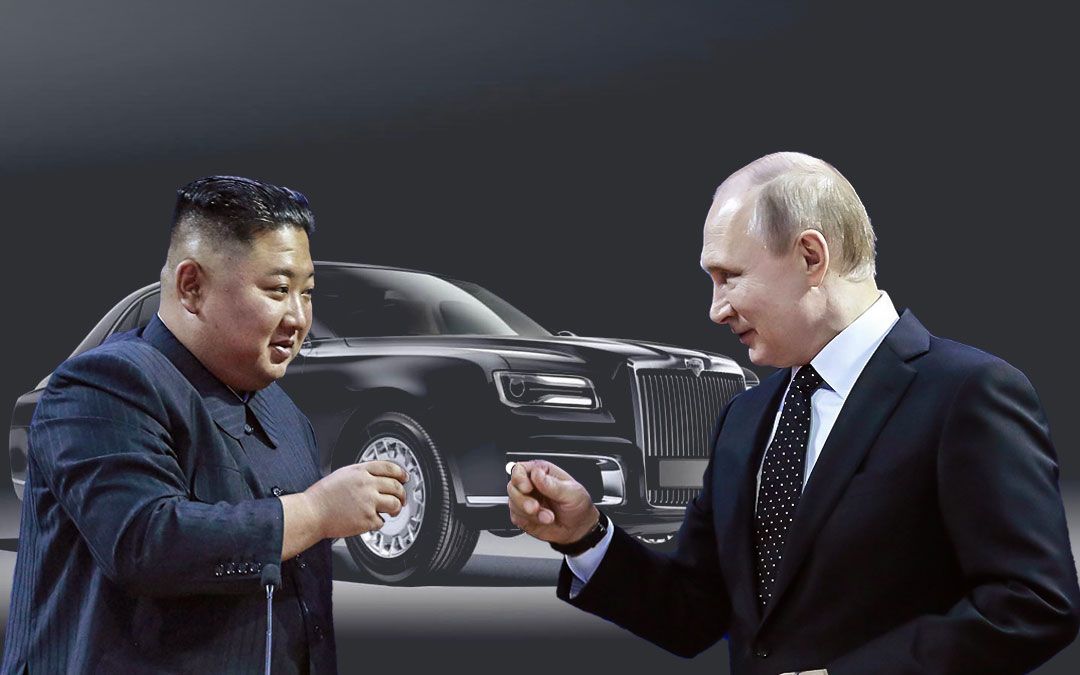
- Strategic Alliance: North Korea and Russia’s partnership strengthens mutual opposition to Western hegemony and underscores a shift toward a multipolar global order.
- Mutual Gains: North Korea benefits from advanced military technology, while Russia secures essential military supplies for its campaign in Ukraine.
- Regional Implications: This alliance, coupled with China’s involvement, risks destabilizing the Indo-Pacific and complicating India’s strategic calculations.
- Global Impact: The partnership highlights resistance to Western sanctions and calls for a nuanced approach to global governance, challenging the dominance of Western-led institutions.
North Korea’s support for Russia in the Ukraine war has shaken the global geopolitical landscape. This gesture of solidarity is strategically significant, signalling its intent to emerge as a pivotal power in a multipolar world, challenging the Western-dominated status quo.
This deeply motivated alliance stems from shared experiences of isolation and resilience under sanctions. North Korea, subjected to heavy economic sanctions and diplomatic isolation by the U.S. and its allies, finds in Russia a partner to access modern military technology and potential economic benefits. Conversely, Russia benefits from a stable supply of artillery shells and munitions, crucial for its military campaigns in Ukraine. This pragmatic partnership, born of necessity, is underpinned by mutual opposition to Western hegemony.
The new Russia-North Korea partnership represents a major shift in the global balance of power. It consolidates forces among nations intent on checking U.S. and allied influence, presenting an ascendant bloc of resistance against the current international order. The implications extend beyond immediate military and economic benefits, reflecting broader trends in international relations and global governance.

For India, this alliance presents both challenges and opportunities. As a significant player in the Indo-Pacific, India must navigate this evolving dynamic carefully. A potential trilateral bloc involving Russia, North Korea, and China could dramatically alter Asia’s security environment. Such a coalition, grounded in military and technological cooperation, might embolden North Korea to adopt an increasingly aggressive stance, destabilizing the region and complicating India’s strategic objectives.
India’s historical relations with Russia add complexity. For decades, Russia was India’s most trusted ally, supplying critical defence equipment and support. However, Moscow’s growing alignment with North Korea and China raises questions about the sustainability of this relationship. India’s neutral stance on the Ukraine war, advocating dialogue and diplomacy, may now be tested as Russia deepens its ties with new partners. This could weaken India’s bargaining capacity in Central Asia and Eurasia.
The Russia-North Korea alliance also impacts the ongoing war in Ukraine. By securing military supplies from North Korea, Russia bolsters its ability to withstand Western sanctions and sustain its military efforts. This prolongs the conflict while emphasizing the emergence of alternative power centres, diminishing the efficacy of Western sanctions and diplomacy.
At a broader level, this alliance reflects the shift towards a multipolar world order, where regional alliances increasingly influence international relations. It challenges the dominance of Western-led institutions, heralding a more fragmented and competitive global landscape.
India must adapt to this new reality by balancing competing interests and shifting alliances. The military and technological dimensions of the Russia-North Korea partnership are particularly concerning. North Korea’s acquisition of advanced military technologies from Russia could enhance its missile systems and overall military capabilities, disrupting the regional balance of power.
These developments have significant implications for regional stability and India’s strategic goals. A militarily empowered North Korea, supported by Russian technology, poses a direct threat to Indo-Pacific security dynamics. This may complicate India’s efforts to counter China’s growing assertiveness and maintain regional stability.

The risks of increased militarization or instability on the Korean Peninsula highlight the challenges posed by the Russia-North Korea alliance. This partnership underscores a world in transition, where nations isolated by the West seek alternative routes to influence.
For Russia, the alliance with North Korea is an opportunity to circumvent Western sanctions and sustain its military campaign in Ukraine. For North Korea, it offers a pathway to enhance its military capabilities and secure a place in the evolving global order. This alliance also demonstrates the limitations of the Western strategy of isolating nations through sanctions, highlighting the need for a more nuanced approach to global governance.
In conclusion, North Korea’s alliance with Russia represents a strategic manoeuvre with far-reaching implications. It signals a shift towards a multipolar world order and challenges Western dominance. For India, navigating this complex and interconnected global landscape will require strategic fine-tuning to protect its interests while maintaining a balanced approach to changing dynamics. The Russia-North Korea partnership is poised to play a critical role in shaping regional and global security soon.
Saisha is pursuing a Bachelor of Diplomacy and Foreign Policy at the JISA, O.P. Jindal Global University. Her areas of interest include economics, business, diaspora studies, and diplomacy. Views expressed are the author’s own.
